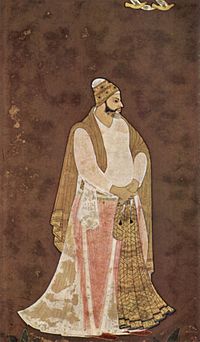Muhammad Quli Qutb Shah
This article needs additional citations for verification. (September 2013) |
| Muhammad Quli Qutub Shah | |
|---|---|
| Fifth Sultan of Qutb Shahi dynasty | |
 | |
| 5th Sultan of the Qutb Shahi Sultanate of Golconda | |
| Reign | 1580–1612[1] |
| Coronation | Unknown |
| Predecessor | Ibrahim Quli Qutb Shah |
| Successor | Sultan Muhammad Qutb Shah |
| Born | 04 April 1565 Golkonda, Golconda Sultanate (now in Telangana, India) |
| Died | 11 January 1612 (aged 46) Daulat Khan-e-Ali Palace, Hyderabad (now in Telangana, India) |
| Spouse | Bhagmati |
| Issue | Hayat Bakshi Begum (wife of Sultan Muhammad Qutb Shah) |
| House | Qutb Shahi dynasty |
| Father | Ibrahim Quli Qutb Shah |
| Mother | Bhagirathi |
| Religion | Shia Islam |
Muhammad Quli Qutb Shah (04 April 1565 – 11 January 1612) was the fifth sultan of the Qutb Shahi dynasty of Golkonda and founded the city of Hyderabad,[2] in South-central India and built its architectural centerpiece, the Charminar and Mecca Masjid. He was an able administrator and his reign is considered one of the high points of the Qutb Shahi dynasty. He ascended to the throne in 1580 at the age of 15 and ruled for 31 years.


Birth, early life and personal life[]
Muhammad Quli Qutub Shah was the third son of Ibrahim Quli Qutb Shah Wali and Hindu Mother Bhagirathi.[3] He was an accomplished poet and wrote his poetry in Persian, Telugu and Urdu.[4] As the first author in the Urdu language, he composed his verses in the Persian diwan style, and his poems consisted of verses relating to a single topic, gazal-i musalsal.[4] Muhammad Quli's Kulliyat comprised 1800 pages, over half were gazals, qasidas on one hundred pages, while the rest contained over 300 pages of matnawi and marsiyas.[4]

City of Hyderabad[]
Muhammad Quli built the city of Hyderabad on the southern bank of the Musi River in 1591. He called architects from all around the world to lay out the city, which was built on a grid plan. The city was named in the remembrance of 4th Caliph of Islam or 1st Imam of Shia Muslim Ali Ibne Abi Talib. He constructed Char Minar and Makkah Masjid. He was the one who laid foundation stone of Makkah Masjid after checking that there was no one in the crowd who never skipped a single prayer except him.
Patronage of literature[]
Quli Qutb Shah was a scholar of Arabic, Persian and Telugu languages. He wrote poetry in Urdu, Persian, and Telugu. His poetry has been compiled into a volume entitled "Kulliyat-e-Quli Qutub Shah." He had the distinction of being the first Saheb-e-dewan Urdu poet[5] and is credited with introducing a new sensibility into prevailing genres of Persian/Urdu poetry.
Notes[]
- ^ Sen, Sailendra (2013). A Textbook of Medieval Indian History. Primus Books. p. 118. ISBN 978-9-38060-734-4.
- ^ "Opinion A Hyderabadi conundrum".
- ^ Narendra Luther (1991). Prince;Poet;Lover;Builder: Mohd. Quli Qutb Shah - The founder of Hyderabad. Publications Division Ministry of Information & Broadcasting. ISBN 9788123023151. Retrieved 13 January 2020.
- ^ Jump up to: a b c Annemarie Schimmel, Classical Urdu Literature from the Beginning to Iqbāl, (Otto Harrassowitz, 1975), 143.
- ^ "Quli Qutub Shah remembered on his 400th death anniversary". The Siasat Daily. 14 January 2012. Retrieved 26 December 2013.
References[]
- Sangaychay Mala by Gajanan Pole
- Prime Ministers of Qutubshhs by Sri Bhopal Rao
- Luther, Narendra. Prince, Poet, Lover, Builder: Muhammad Quli Qutb Shah, The Founder of Hyderabad
- Books on Muhammad Quli Qutb Shah
- Chopra, R.M., The Rise, Growth And Decline of Indo-Persian Literature, Iran Culture House, New Delhi, 2012.
External links[]
| Wikimedia Commons has media related to Muhammad Quli Qutb Shah. |
- 1565 births
- 1612 deaths
- People from Hyderabad district, India
- Kings of Golconda
- Telugu people
- Qutb Shahi dynasty
- Urdu-language poets
- 1611 in India
- 1580 in India
- Urdu-language writers from Mughal India
